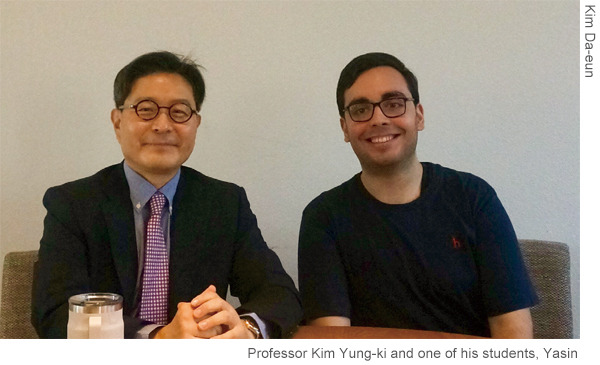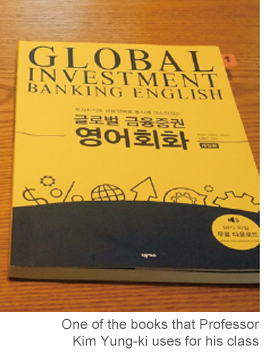In the University of Seoul (UOS), there are many international students as well as domestic students. The Institute of International Cooperation and Education (IICE) at UOS does a lot of work for both international and domestic students. For international students, IICE offers scholarships, provides opportunities to learn Korean, to make friends in the UOS, and, moreover, forms a community for international students to make acquaintances with each other. This information can be found on the IICE’s website (QR code is attached to this article). Moreover, there are certain classes that are only available to international students. For instance, there is a class which offers ways to speak Korean more precisely and a class that teaches entrepreneurship. Through these activities and classes, international students in UOS can have an exciting and instructive campus life.
The UOS Times received a report that one of the professors who teaches only international students is so enthusiastic that he deserves to have an article written about him, in order to promote IICE. Professor Kim Yung-ki teaches four classes only for international students: Global Management 101, Marketing in the Global Market, Financial Accounting, and Entrepreneurship and Enterprise Innovation. Based on his marketing and accounting experience in the U.S., he teaches both theories and his own tips for students. He is now working as a marketing support for a start-up alongside his teaching career. The UOS Times interviewed him for more information on the classes he teaches.

Q1. What classes do you teach?
A1. I teach four classes: Special Issues in Entrepreneurship and Innovation, Special Issues in Business and Accounting, Global Marketing Management and lastly, Special Topics in Global Business. I teach only the international students at Cheonnong Hall. It is a shame that only international students can take my class, but I am satisfied with all the brilliant international students in my classes.
Q2. How long have you been teaching students at UOS?
A2. I have been teaching students at UOS for four years.
Q3. You are currently working as a management support at a start-up. Is it hard to do both jobs?
A3. It surely is. However, it is also rewarding. Meeting and teaching international students from various countries has been a great experience for me. My students and I learn a lot from each other.
Q4. What goes on in your mind when you meet and teach the students?
A4. I do meet and teach my students, but I don’t just treat them as “students.” Rather, I see them as future global investors, hands-on workers in marketing, and my clients! I don’t think I “teach” students; rather, I “serve” them. I do not think my relationship with my students is like the traditional, hierarchical professor-student relationship. I see them as my clients who need my knowledge and consulting skills. I also consider them fellows, global investors, and hands-on workers in management and marketing fields. In that matter of fact, I do not “teach” them; I “work with” them. Through this point of view, I feel that my students can learn more, as can I. I also consult on career paths for both international and domestic students. This helps me understand their traits better.

Q5. What is the most rewarding part of teaching students?
A5. The other day, I got an email from a former international student from France, saying that she had just got a job as a marketing expert at L’Oreal based on what she had learned from me at UOS. I think this is the most rewarding part. Students who I taught and guided on their career path contact me when they get jobs in the fields of marketing or management, and I feel like I made more fellow experts. Every time I hear my students say that they have accomplished something in their field, in relation to marketing, I feel rewarded. I think training the next generation in one’s own field is the most rewarding part for every professor.
Q6. What is the hardest part when you teach students?
A6. Students taking my class have different majors at UOS, and that causes some variances in understanding among students. Adjusting it is the hardest. I have to consider each student’s level of knowledge, major, and their home countries. In addition, international students are from abroad, and they have to adapt to new surroundings in Korea. As they also have to study, there are more factors to be considered when I communicate with them.
Q7. What do you want international students to learn from UOS?
A7. At UOS, there are a lot of classes that teach English conversation and focus on conducting global business for international students. As they are international students, it is important to learn about presenting themselves in a foreign country and foreign culture. Learning how to communicate in different cultures is essential and useful for students to live in this globalized world.
Q8. One of your students told The UOS Times that your class is instructive. What characteristics should a good professor have?
A8. The spirit of service, definitely! As a professor, it is easy to fall into a routine. However, teaching and treating students are dynamic work. Every student is different and unique. Thus, it is important for a professor to keep that in mind. I think treating students with some level of respect is a foundation on which relationships can be built.
Through this interview, The UOS Times showcased Professor Kim’s enthusiasm and established how much he cares for his students. It is surely instructive for international students that there is an enthusiastic professor with solid curriculums and activities for them at UOS. Professor Kim told us that he wanted the readers of this magazine to take up all challenges and opportunities that one can get. Moreover, he wants international students at UOS to enjoy their lives on campus and learn valuable assets in the curriculum.

Kim Da-eun
daeunkim749@uos.ac.kr

